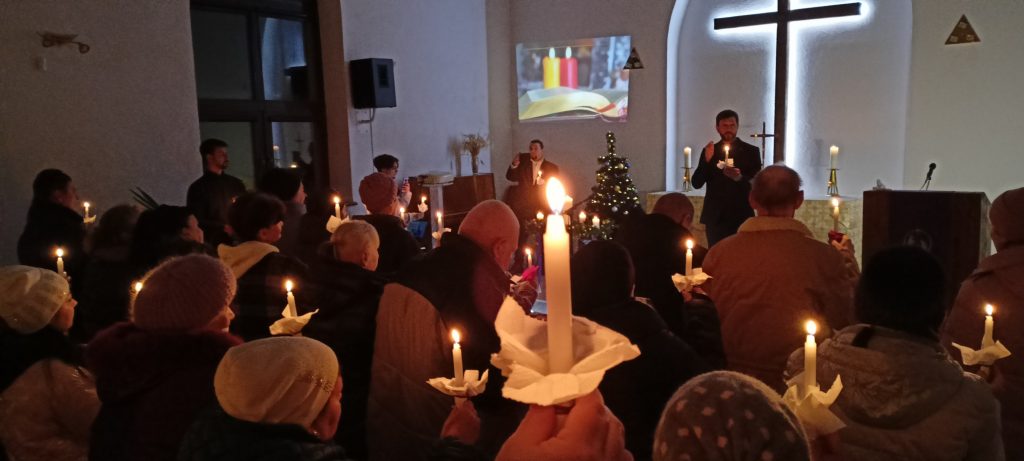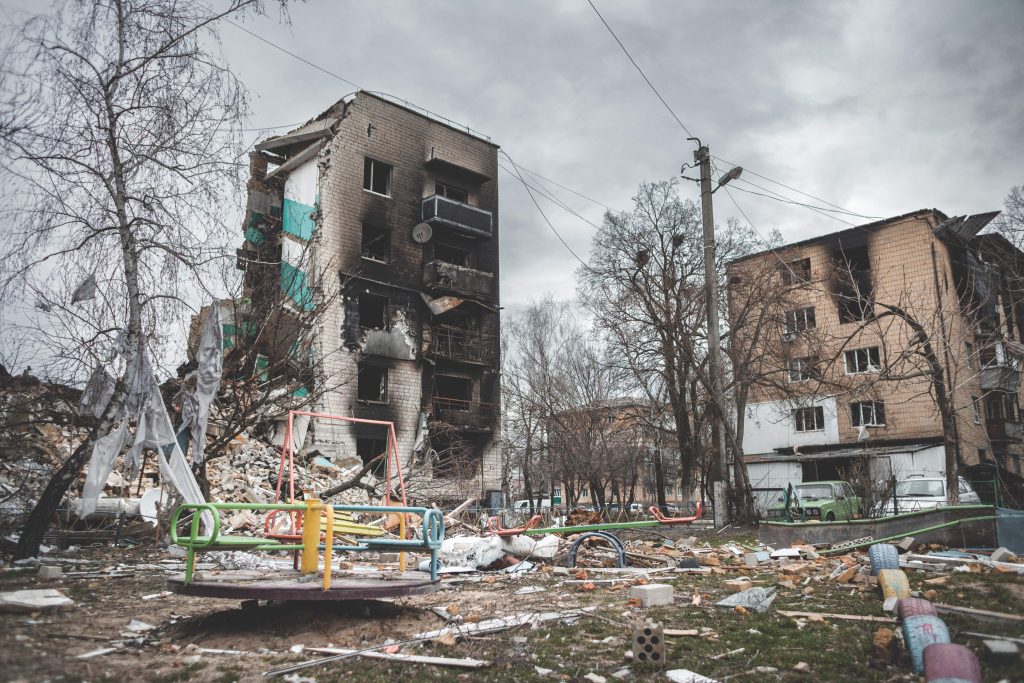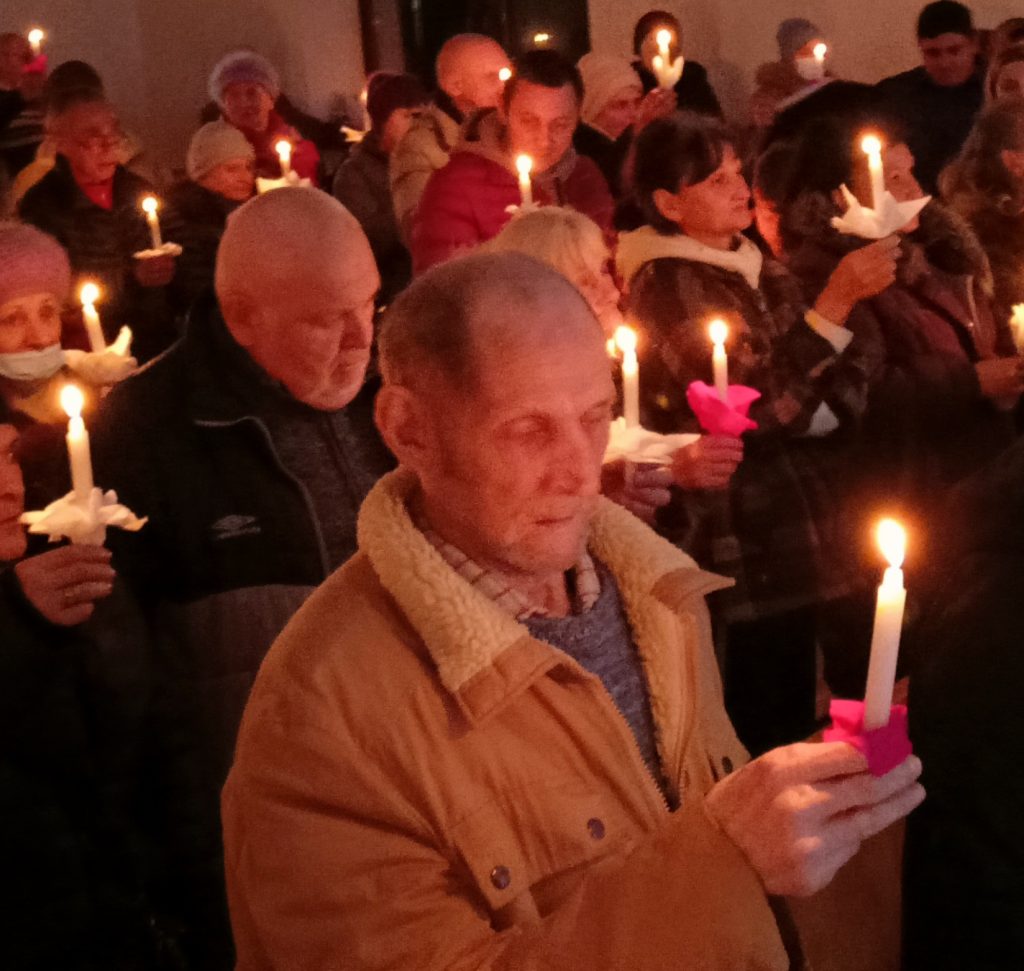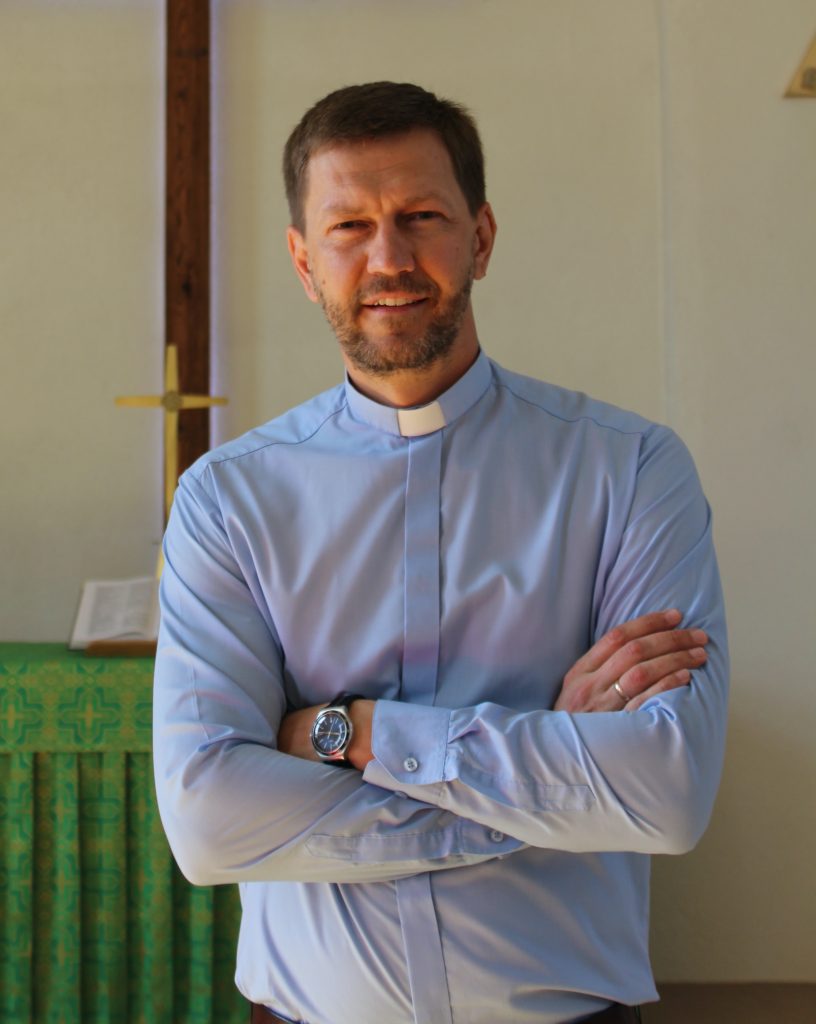Christmas Peace in a Land of War: Reflections from Ukraine

2022 Christmas Eve service in Nikolaev, Ukraine.
by Oleksiy Navrotskyy
Since the ancient world, humanity has measured time by counting days from major events. The birthday of the emperor or the day of his enthronement, the day of a volcanic eruption, or the year of a plague could all serve as the starting point for a new calendar.
The modern world we live in counts its time from the birth of Jesus Christ, which took place about 2023 years ago in a small town named Bethlehem. It is a remarkable fact that, since then, the world at large has never agreed on an event worthy of replacing Christmas and beginning a new universal calendar.
Few people know this, but in my own country of Ukraine, there now exists an additional calendar. As I write this article, it is currently Day 631. Regardless of their location, Ukrainians scattered around the world have kept a personal calendar beginning on February 24, 2022—the day of full-scale Russian invasion into Ukraine. This is a bitter enumeration for every Ukrainian and for many others around the world. None of us could imagine that the war in Ukraine would rise into hundreds of days nor that the death toll would pass into the hundreds of thousands.
It once seemed almost unimaginable that a full-fledged war could take place in our modern, enlightened world. We believed that there were no longer compelling reasons for nations living peacefully adjacent to one another to suddenly take up arms and begin exterminating each other. At the end of World War II, humanity adopted the slogan of “never again.” But just 80 years later we are again experiencing a terrible war in the centre of Europe. We watch in horror as new regional wars emerge, and are terrified of the possibility of another world war.
Reflecting on this war, I have come to believe that war is demonic in nature, transforming people into a state worse than animals.
What have I, a Ukrainian pastor, learned about war? Many things. War is a terrible, irrational, animalistic, unjust, and mad condition. War brings unending feelings of despair, danger, vulnerability, and uncertainty. War ruins the childhood of thousands, and separates spouses from one another and parents (and grandparents) from their crying children. War is broken men, disabled and shell-shocked veterans, and kids growing up without fathers. War is the destruction of cities, the pollution of fertile fields, the poisoning of rivers and air, and the devastation of the animal world. War is a bitter mixture of fear, despair, rage. Reflecting on this war, I have come to believe that war is demonic in nature, transforming people into a state worse than animals.
It’s scary to admit, but this war has once again shown us the real but hidden nature of humankind. Humanity has never been able to overcome the virus of war which sleeps in the blood of man. Education, culture and art, law and state, and international diplomacy turn out to be powerless against the baser instincts of man. The ancient diagnosis of humanity written in God’s Word is confirmed again and again: “None is righteous, no, not one; no one understands; no one seeks for God. All have turned aside; together they have become worthless…. Their mouth is full of curses and bitterness. Their feet are swift to shed blood; in their paths are ruin and misery, and the way of peace they have not known. There is no fear of God before their eyes” (Romans 3:10-12, 14-18).
The Bible is right again. Human beings are incorrigible. The tragedy that happened in the Garden of Eden has consequences even in the 21st century. The ancient demonic sabotage directed against God and His creation—against His children, Adam and Eve—became the trigger and root cause of all subsequent human conflict and bloodshed.

Destruction in Ukraine: Adobe Stock, 2022.
Modern war, as I see it from the window of my home in Ukraine, is just the tip of a huge iceberg. It is nothing less than the continuation of the thousands of other micro-wars in which we are daily involved. I’m talking about those battles that take place in our homes between spouses, between children, between friends. It’s not hard to remember the numerous battles that happen in our offices, kitchens, bedrooms, gyms, streets, and even churches. Yes, they are sometimes replaced by brief truces, temporary freezes, protracted negotiations, or momentary capitulations. But it is not long after things quiet down that we are involved again in the next micro-war. Some researchers have suggested that the average person is involved in three to seven protracted years-long conflicts at any given time. Isn’t it so?
We wage these micro-wars not out of any great passion but simply, it seems, because we are unable to do otherwise. Attack and defense, a short-term truce, and then new confrontation is our natural cycle. Peace, quiet, and safety are only temporary pauses in the midst of our habitual conflicts. But because this temptation to warfare lives in the blood of us all, we understand why even a short and fragile peace is so dear to our hearts; the war in Ukraine has put a mirror in front of all of us. And the reflection we see scares us.
At the same time, however, the war in Ukraine has taught us some very precious lessons—lessons we could never obtain at seminary. Against the background of the Russian-Ukrainian war, we have suddenly realized how beautiful and precious God’s everyday gifts are. Blessings like a peaceful life, safety, time with family, the ability to go to work or a park or a gym, the ability to sleep at night, to enjoy holidays with children or grandchildren, to share breakfast with loved one, to go on summer vacation, and, of course, Christmas. God generously and unconditionally provided all this to those of us in Ukraine over the course of many peaceful decades.
How fragile that peace turned out to be. These blessings disappeared in one moment on February 24, 2022. How good God was for us. How good He remains for you, my friend!
While we do not now enjoy the routine gifts God once gave, in their place He has sent into the hearts of many an amazing hunger for the Word of God and for the Church.
I believe that the Lord has not turned away from Ukraine and Ukrainians. While we do not now enjoy the routine gifts God once gave, in their place He has sent into the hearts of many an amazing hunger for the Word of God and for the Church. Since the outbreak of war, huge numbers of Ukrainians have turned back to church, to prayer, and to worship. Old prejudices against religion have receded, and many who were once dismissive of Christianity have now crossed the threshold of the church. These new Christians, like little children experiencing it all for the first time, sit in the sanctuary with their eyes wide open, eagerly absorbing everything the pastor says, learning how to sing hymns, confessing the faith in the words of the Creed, and praying the Lord’s Prayer. Watching this miracle, I remember the words from the book of Amos: “‘Behold, the days are coming,’ declares the Lord GOD, ‘when I will send a famine on the land—not a famine of bread, nor a thirst for water, but of hearing the words of the LORD” (8:11).
In the first few weeks of the war, we successfully evacuated out of the country more than 40 members—mostly women and children—from the Lutheran congregation in Nikolaev. Only six men and three women of the church remained. Now, after 18 months of war, the sanctuary of the church in Nikolaev is 105 percent full. The weekly confirmation group consists of more than twenty new adults. We often have trouble providing enough seating for all those present during Sunday morning worship. And there are days when I am powerless to dismiss churchgoers after service; they want to stay longer singing hymns, drinking coffee, and just being present in the church. For 18 months of war, our Nikolaev Lutheran church has been the spiritual shelter (or even rehab) for hundreds of people seeking comfort and hope for their souls; a way to understand the meaning of their suffering; and love and forgiveness. Moreover, thanks to the support of the Ukraine Aid Fund generously provided by the members of Lutheran Church–Canada, we have been able to meet many of the material and health needs of people who have found themselves in despair because of war, unemployment, and illness.

2022 Christmas Eve service in Nikolaev, Ukraine.
One of my brightest memories of new life in the Lutheran congregation in Nikolaev was our Christmas celebration in 2022. Despite frequent air raids and dark streets due to blackouts, people came to church that night to celebrate the birth of Christ the King, the Prince of Peace. Seeing these people come through the doors, I was reminded of the wise men—those pilgrims who came to Jerusalem from distant lands to see and worship the newborn King. Surprised, awkward, not knowing a single Christmas carol, the new believers of Nikolaev Lutheran Church held candles in their hands and listened intently as they heard the hymn “Silent Night” be sung for the first time.
The Christmas Gospel tells us of the Eternal Son of God, the Prince of Peace, who entered into a world full of war, fear, rage, and death. That message is perceived differently when it is heard in a country at war. But this is exactly what the Gospel is about. Long ago, Satan, sin, and death entered into this world of humanity, and infected us with fear, disbelief, war, and rage. But Christ the King has come into this broken world of chaos, injustice, and lies. He came to us as a Suffering Servant, Divine Redeemer, and Heavenly Peacemaker. And He brings us even now forgiveness of sins, reconciliation with God, and the promise of eternal life.
“For to us a Child is born, to us a Son is given… His name shall be called Prince of Peace. And of the increase of His government and of peace there will be no end”—so proclaims the ancient prophet (Isaiah 9:6-7). And the heavenly heralds sing: “Glory to God in the highest, and on earth peace among those with whom He is pleased” (Luke 2:14). And the Apostle declares: “In Christ, God was reconciling the world to Himself, not counting their trespasses against them, and entrusting to us the message of reconciliation” (2 Corinthians 5:19).
 How sweet those promises are to us all, people stuck in a world of micro- and macro-wars! How comforting and uplifting this Christmas message is for our homes, offices, parliaments, hospitals, churches, and trenches. This December 25, we celebrate 2024 years of the Incarnation of the Divine Peace Maker, Jesus Christ. His birthday was the foundation of our world calendar. We must by no means seek to replace that Christmas chronology! For it is His birthday which marked the beginning of our salvation—the moment in history when our Divine Redeemer stepped into the world, bringing with Him the precious gifts of forgiveness, peace, and eternal life.
How sweet those promises are to us all, people stuck in a world of micro- and macro-wars! How comforting and uplifting this Christmas message is for our homes, offices, parliaments, hospitals, churches, and trenches. This December 25, we celebrate 2024 years of the Incarnation of the Divine Peace Maker, Jesus Christ. His birthday was the foundation of our world calendar. We must by no means seek to replace that Christmas chronology! For it is His birthday which marked the beginning of our salvation—the moment in history when our Divine Redeemer stepped into the world, bringing with Him the precious gifts of forgiveness, peace, and eternal life.
———————
Rev. Oleksiy Navrotskyy is pastor of Nikolaev Lutheran Church in Ukraine and a Lutheran Church–Canada-supported missionary.





